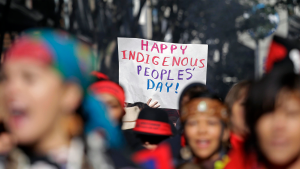Indigenous Peoples’ Day is an opportunity to celebrate and remember the indigenous populations that protected and cultivated the lands the United States is blessed to have prior to their mass genocide and colonization. According to the United States Census Bureau, in 2010, approximately 5.2 million people in the U.S. identified as Indigenous American and Alaskan Native, either alone or in combination with one or more other races. Currently, there are over 600 Native Nations in the U.S. It is an important day meant to recognize the achievements and contributions indigenous people have and continue to make to improve world issues; for example, many distinct tribes, nations, and peoples’ are working hard for environmental protection.
Indigenous Peoples’ Day has grown to an international level, and now works to promote and protect the rights of the world’s indigenous people. The first International Day of the World’s Indigenous People was observed in Geneva in 1982 by the UN. In the U.S., the following states officially celebrate Indigenous Peoples’ Day: Alabama, Alaska, District of Columbia, Hawai’i, Idaho, Maine, Michigan, Minnesota, New Mexico, North Carolina, Oklahoma, Oregon, South Dakota, Vermont, and Wisconsin! Want to learn more about Indigenous Peoples’ Day? Explore the brief list of resources below:
